
The Allman Brothers Band were an American rock band formed in Jacksonville, Florida in 1969 by brothers Duane Allman and Gregg Allman, as well as Dickey Betts, Berry Oakley, Butch Trucks (drums), and Jai Johanny "Jaimoe" Johanson (drums). Subsequently, based in Macon, Georgia, the band incorporated elements of blues, jazz, and country music, and their live shows featured jam band-style improvisation and instrumentals.
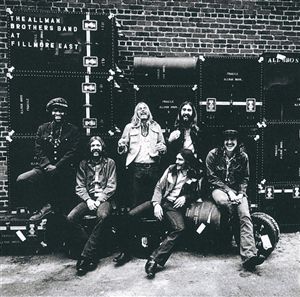
At Fillmore East is the first live album by American rock band the Allman Brothers Band, and their third release overall. Produced by Tom Dowd, the album was released in July 1971 in the United States by Capricorn Records. As the title indicates, the recording took place at the New York City music venue Fillmore East, which was run by concert promoter Bill Graham. It was recorded over the course of three nights in March 1971 and features the band performing extended jam versions of songs such as "Whipping Post", "You Don't Love Me" and "In Memory of Elizabeth Reed." When first commercially released, it was issued as a double LP with just seven songs across four vinyl sides.

Eat a Peach is the third studio album by American rock band the Allman Brothers Band. Produced by Tom Dowd, the album was released on February 12, 1972, in the United States by Capricorn Records. Following their artistic and commercial breakthrough with the release of the live album At Fillmore East (1971), the Allman Brothers Band got to work on their third studio album. Many in the band were struggling, however, with heroin addictions, and checked into rehab to confront these problems. On October 29, 1971, group leader and founder Duane Allman was killed in a motorcycle accident in the band's hometown of Macon, Georgia, making it the final album to feature the guitarist.
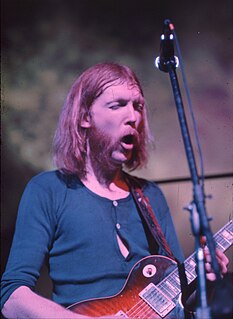
Howard Duane Allman was an American rock guitarist, session musician, and the founder and original leader of the Allman Brothers Band.

Gregory LeNoir Allman was an American singer-songwriter and musician. He was known for performing in the Allman Brothers Band. Allman grew up with an interest in rhythm and blues music, and the Allman Brothers Band fused it with rock music, jazz, and country at times. He wrote several of the band's biggest songs, including "Whipping Post", "Melissa", and "Midnight Rider". Allman also had a successful solo career, releasing seven studio albums. He was born and spent much of his childhood in Nashville, Tennessee, before relocating to Daytona Beach, Florida and then Richmond Hill, Georgia.
Hour Glass was a 1960s rhythm and blues band based in Los Angeles, California in 1967 and 1968. Among their members were two future members of the Allman Brothers Band and three future studio musicians at the Fame Studios in Muscle Shoals, Alabama.
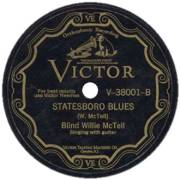
"Statesboro Blues" is a Piedmont blues song written by Blind Willie McTell, who recorded it in 1928. The title refers to the town of Statesboro, Georgia. In 1968, Taj Mahal recorded a popular blues rock adaptation of the song with a prominent slide guitar part by Jesse Ed Davis. His rendition inspired a recording by the Allman Brothers Band, which is ranked number nine on Rolling Stone magazine's list of the "100 Greatest Guitar Songs of All Time". In 2005, the Atlanta Journal-Constitution ranked "Statesboro Blues" number 57 on its list of "100 Songs of the South".

Claude Hudson "Butch" Trucks was an American drummer. He was best known as a founding member of The Allman Brothers Band. Trucks was born and raised in Jacksonville, Florida. He played in various groups before forming the 31st of February while at Florida State University in the mid 1960s. He joined the Allman Brothers Band in 1969. Their 1971 live release, At Fillmore East, represented an artistic and commercial breakthrough. The group became one of the most popular bands of the era on the strength of their live performances and several successful albums. Though the band broke up and reformed various times, Trucks remained a constant in their 45-year career. Trucks died of a self-inflicted gunshot wound on January 24, 2017.
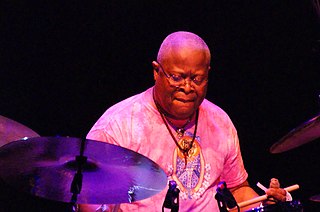
Jai Johanny Johanson, frequently known by the stage name Jaimoe, is an American drummer and percussionist. He is best known as one of the founding members of The Allman Brothers Band.

The Allman Brothers Band is the debut studio album by American rock band the Allman Brothers Band. It was released in the United States by Atco Records and Capricorn Records on November 4, 1969 and produced by Adrian Barber. Formed in 1969, the Allman Brothers Band came together following various musical pursuits by each individual member. Following session work, Duane Allman moved to Jacksonville, Florida where he led large jam sessions with his new band, one he had envisioned as having two guitarists and two drummers. After rounding out the lineup with the addition of his brother, Gregg Allman, the band moved to Macon, Georgia, where they were to be one of the premiere acts on Capricorn.
Red dog or Red Dog may refer to:

Idlewild South is the second studio album by American southern rock band the Allman Brothers Band. Produced by Tom Dowd, the album was released on September 23, 1970 in the United States by Atco Records and Capricorn Records. Following the release of their 1969 debut, the Allman Brothers Band toured the United States extensively to promote the album, which had little commercial success. Their performances, however, did create positive word of mouth exposure that extended to more famous musicians, such as Eric Clapton, who invited group leader Duane Allman to contribute to his 1970 album Layla and Other Assorted Love Songs.

Brothers and Sisters is the fourth studio album by American rock band The Allman Brothers Band. Co-produced by Johnny Sandlin and the band, the album was released in August 1973 in the United States by Capricorn Records. Following the death of group leader Duane Allman in 1971, the Allman Brothers Band released Eat a Peach (1972), a hybrid studio/live album that became their biggest yet. Afterwards, the group purchased a farm in Juliette, Georgia, to become a "group hangout". However, bassist Berry Oakley was visibly suffering from the death of Duane: he excessively drank and consumed drugs. After nearly a year of severe depression, Oakley was killed in a motorcycle accident not dissimilar from his friend's in November 1972 making it the last album to feature Oakley.
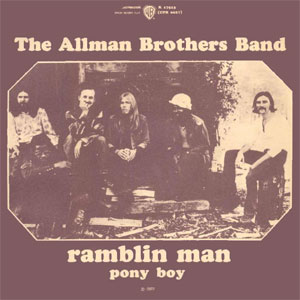
"Ramblin' Man" is a song by American rock band The Allman Brothers Band, released in August 1973 as the lead single from the group's fourth studio album, Brothers and Sisters (1973). Written and sung by guitarist Dickey Betts, the song was inspired by a 1951 song of the same name by Hank Williams. It is considerably more inspired by country music than other Allman Brothers Band compositions, which made the group reluctant to record it. Guitarist Les Dudek provides guitar harmonies, and it was one of bassist Berry Oakley's last contributions to the band.
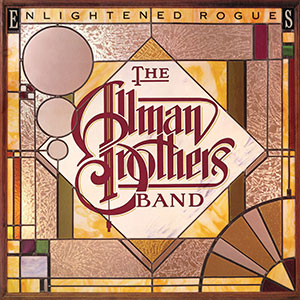
Enlightened Rogues is the sixth studio album by American rock band the Allman Brothers Band. Produced by Tom Dowd, the album was released in February 1979 in the United States by Capricorn Records and PolyGram Records elsewhere. The Allman Brothers Band had broken up in 1976 following internal turmoil, amplified by escalating drug use. The band members splintered into different acts — among those Great Southern, Sea Level, and the Gregg Allman Band. Guitarist Dickey Betts approached his bandmates in 1978 with the prospects of a reunion. After two former members declined to return, they added new members which made it the first to feature guitarist Dan Toler and bassist David Goldflies. Living together in Sarasota, Florida, they rehearsed and wrote the material for their next album in fall 1978.
"Whipping Post" is a song by The Allman Brothers Band. Written by Gregg Allman, the five-minute studio version first appeared on their 1969 debut album The Allman Brothers Band. The song was regularly played live and was the basis for much longer and more intense performances. This was captured in the Allman Brothers' 1971 double live album At Fillmore East, where a 23-minute rendition of the song takes up the entire final side. It was this recording that garnered "Whipping Post" spots on both the Rock and Roll Hall of Fame's 500 Songs that Shaped Rock and Roll list and Rolling Stone's list of "The 500 Greatest Songs of All Time".
"Blue Sky" is a song by the American rock band the Allman Brothers Band from their third studio album, Eat a Peach (1972), released on Capricorn Records. The song was written and sung by guitarist Dickey Betts, who penned it about his girlfriend, Sandy "Bluesky" Wabegijig. The track is also notable as one of guitarist Duane Allman's final recorded performances with the group. The band's two guitarists, Duane Allman and Dickey Betts, alternate playing the song's lead: Allman's solo beginning 1:07 in, Betts joining in a shared melody line at 2:28, followed by Betts's solo at 2:37. The song is notably more country-inspired than many songs in the band's catalogue.

"Midnight Rider" is a song by the American rock band the Allman Brothers Band. It was the second single from their second studio album, Idlewild South (1970), released on Capricorn Records. The song was primarily written by vocalist Gregg Allman, who first began composing it at a rented cabin outside Macon, Georgia. He enlisted the help of roadie Robert Kim Payne to complete the song's lyrics. He and Payne broke into Capricorn Sound Studios to complete a demo of the song.
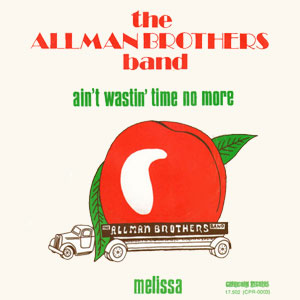
"Ain't Wastin' Time No More" is a song by the American rock band the Allman Brothers Band. It was the lead single from their third studio album, Eat a Peach (1972), released on Capricorn Records. The song, written by Gregg Allman, largely concerns the death of his brother, Duane Allman, who was killed in a motorcycle crash in 1971.

Searching for Simplicity is the sixth studio album by American singer-songwriter Gregg Allman, released on November 11, 1997 by 550 Music. The album is mainly composed of cover songs associated with Ray Charles, James Carr, and Jimmy Hughes, as well as originals.















